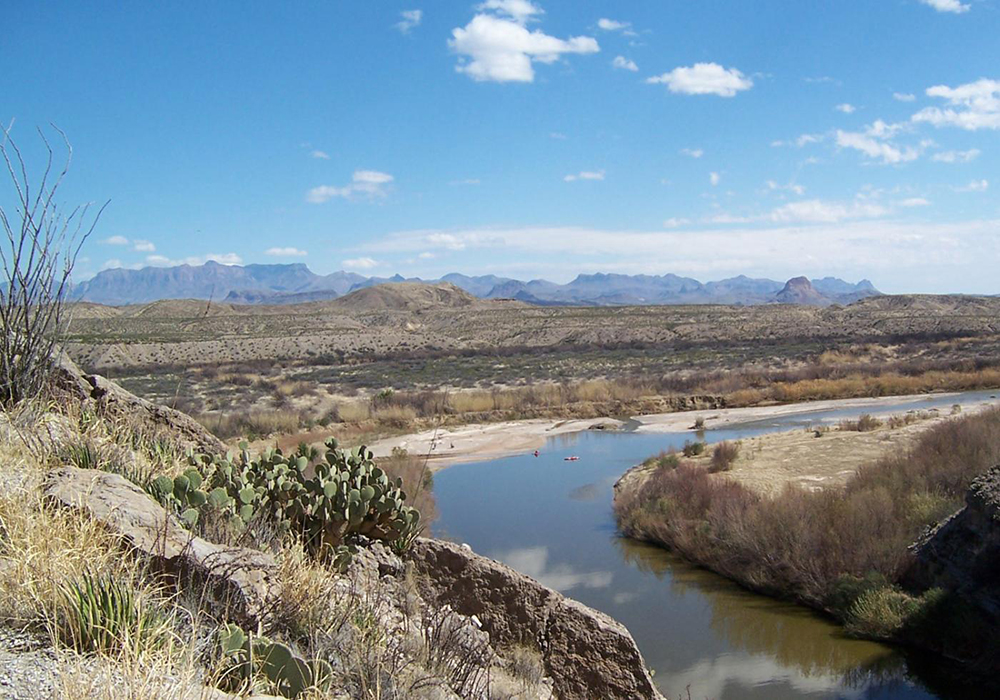
The Rio Grande in Big Bend National Park marks the border between the US and Mexico. Border Patrol agents will have more access to national park land in a bill that passed the House this week. (Photo courtesy of NPS/Eric Leonard)
WASHINGTON – The sweeping vistas of Big Bend National Park may be breathtaking, but the park’s proximity to the U.S.-Mexico border makes the deep canyons of the Rio Grande kindling for political feuds.
For much of the 20.7 million acres of federally owned land on the border, access for both visitors and officials – including Border Patrol agents – is limited to foot and horseback traffic to preserve the environment.
The relationship between the National Park Service and the Border Patrol could change with a bill the House of Representatives passed this week.
H.R. 2578, an omnibus bill that includes multiple provisions for conservation, includes a provision that would waive 16 laws to allow the Border Patrol nearly unlimited access federal lands within 100 miles of the border. This would allow trucks to drive where motor vehicles are normally unauthorized, construction for infrastructure in otherwise untouched areas and drones to patrol where overflights are otherwise prohibited.
That includes the entirety of Big Bend National Park, along with 53 other national park properties and 228 national wildlife refuges in the four states on the Mexican border and along the U.S.-Canadian border.
Kim Thorsen, a deputy assistant secretary at the Department of the Interior, testified before a House subcommittee that the bill could harm the natural and cultural resources in federal care.
Thorsen oversees law enforcement, security and emergency management and said that the DOI works closely with the Department of Homeland Security – which oversees the U.S Customs and Border Patrol – to keep the U.S. border safe.
“The administration opposes H.R. 1505,” she said, using a former number for the bill. “We believe a better model for the protection of the border is the current approach of collaborating among departments and using the best expertise in each to solve problems.”
Officials with the DHS also testified that cooperation with various agencies was crucial to success in controlling crime on the border.
Border Patrol Deputy Chief Ronald Vitiello testified alongside Thorsen.
“We respect the missions of these agencies and we recognize the importance of the preservation of the American landscape,” Vitiello said. “Border security and environmental stewardship are not mutually exclusive. Through common sense and collaborative efforts, we can achieve these dual missions.”
Rep. Rob Bishop, R-Utah, chairman of the Subcommittee on National Parks, Forests and Public Lands of the House Natural Resources Committee, introduced the bill.
“We have had several members of our Border Patrol who have been murdered in this exact same area,” Bishop said during the House debate on the bill. “More and more individuals, both Americans and of Mexican extraction, are being assaulted, murdered, raped and robbed in this particular area, and it is all happening on federal land.”
He brought a map to the House floor and pointed out that most border-related crimes occur on federally owned land with access restrictions rather than on privately owned land.
In some wilderness areas, for example, motorized vehicle use is prohibited to protect endangered species, such as the Sonoran pronghorn antelope, and delicate environments. Patrols currently must work on foot in these areas.
“Border Patrol should not be stopped or inhibited in anything they do. The environment is being trashed by illegal entry,” Bishop said in a subcommittee hearing in April 2011 on the issue. “It is not national security that is threatening our environment; it is the lack of national security that is threatening our environment.”
Some national park supporters say that increasing border security in such a way would harm the environments set aside for federal protection.
At the National Parks Conservation Association, a private non-profit that serves as a watchdog for the parks, opposition to the omnibus bill is abundant.
“It’s just unfathomable how far this goes,” Craig Obey, NPCA vice president for governmental affairs, said. “It just says, ‘Do whatever the heck you want and damn with the rest.’”
Obey and Thorsen said that coordination between Border Patrol and park officials can be mutually beneficial. In her testimony, Thorsen said law enforcement personnel from the Department of the Interior frequently accompany Border Patrol agents on patrols.
“The Park Service often knows the terrain better, frankly, and can help them,” Obey said. “What you want to have is a system where people work together.”
Rep. Raúl Grijalva, D-Ariz., the senior Democrat on the subcommittee, opposed the bill and, with the majority of House Democrats, voted against it.
The bill passed 303-112.
“This is theater of the absurd,” Grijalva said at a press conference Tuesday. “The solution to the stress we have on that border is not to suspend laws that protect us.”
The bill now goes to the Senate.
While some Border Patrol activities may have an impact on the landscape, both DOI and DHS officials said that leaving the border unprotected could cause more damage to the environment.
“We recognize that, despite our efforts to institute a wide variety of best practices, our border security mission can have an impact to the environment,” Vitiello said. “We also know, however, that we can patrol the border in an educated and environmentally conscious manner and we remain to doing so.”
_____
Editor’s note: This story was previously published on the Scripps Howard Foundation Wire.



Bad idea. The personal friends I know who have property or ranches close to the border and are US citizens complain of interminable harrassement by federal officers. They have been stopped over and over, by the constant rotation of new officers who don’t know who the landowners are and they often trample over valuable land with their vehicles justifing themselves with the inevitable “hot pursuit” doctrine. Cops and robbers playing tag in our border national parks does not augur well for the beauty and natural health of our parks.